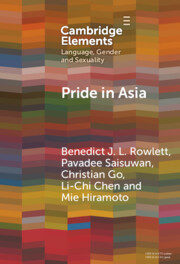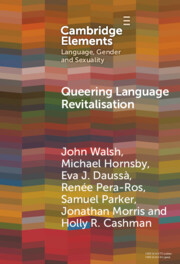About the series
Since its emergence as a field of study within linguistics in the 1970s, Language, Gender and Sexuality has grown exponentially to become one of the most popular areas of study for undergraduate students of linguistics and related disciplines. The field has developed its own theories, methodologies and analytical frameworks which have been applied to a range of contexts such as education, workplaces, law and media. The need for developing a greater understanding of the role of language in upholding and challenging gender- and sexuality-based inequalities has grown in response to increased public awareness of real-world problems such as gender-based violence, homophobic and transphobic hate crimes and hate speech, and a range of structural inequalities relating to gender and sexuality. The Cambridge Elements in Language, Gender and Sexuality series highlights the role of language in understanding issues, identities and relationships in relation to multiple genders and sexualities. The series provides a comprehensive home for key topics in Language, Gender and Sexuality which readers can consult for up-to-date coverage and the latest developments in the field.
Cambridge Elements in Language, Gender and Sexuality will be of interest to undergraduate, graduate students and academic researchers at all career levels who are looking for a reliable and in-depth introduction to key elements in Language, Gender and Sexuality. Many undergraduate linguistics courses in the UK, North America and elsewhere contain specific modules on Language, Gender and Sexuality (or similar). Some postgraduate courses in linguistics also cover work on gender and sexuality, especially those programmes which focus on sociolinguistics and applied linguistics. Given that the series consists of contributions that are shorter than monographs but longer than journal articles, this will facilitate publication of contributions that speak more directly to activist campaigns and initiatives, and contributions which are more policy and practice-oriented in their focus. The format of contributions to the series also means that some Elements can be developed for very specific audience and events (e.g. use at workshops, conference, short courses and summer schools).


Series topics
The series will comprise innovative, high quality research and will provide a platform for the best contemporary scholarship in the field of Language, Gender and Sexuality. The series focuses on key and emerging topics, concepts and methods in the field of language, gender and sexuality. It revisits and reviews core issues as well as exploring new, emerging and cutting-edge topics within the field.
Topics in the series may include (but are not limited to):
About the Editors
Helen Sauntson is Professor of English Language and Linguistics at York St John University, UK. Her research areas are language in education and language, gender and sexuality. She has published a range of books, chapters and journal articles in these areas. Her books include New Perspectives on Language and Sexuality (2007), Approaches to Spoken Classroom Discourse (2012), Key Debates in Sex and Relationships Education (2016), Language, Sexuality and Education (2018), Schools as Queer Spaces (2020) and Academic Irregularities: Language and Neoliberalism in Higher Education (2020). With Allyson Jule, she is co-editor of the Palgrave Studies in Language, Gender and Sexuality book series. She sits on the editorial boards of the journals Gender and Language and the Journal of Language and Sexuality. Within her institution, Helen is Director of the Centre for Language and Social Justice Research.
Holly R. Cashman is Professor of Spanish at University of New Hampshire (USA), core faculty in Women's and Gender Studies, and coordinator of Queer Studies. She currently serves as the president of the International Gender and Language Association (IGALA) and president of the executive board of the Association of Departments of Foreign Languages (ADFL) of the Modern Languages Association. Her research interests include multilingualism in individuals, interaction, and communities, and language, gender, and sexuality. She is the author of Queer, Latinx, and Bilingual: Narrative resources in the negotiation of identities (2018, Routledge). Her research has been published in journals, including Language in Society, Gender & Language, Language & Intercultural Communication, Multilingua, Spanish in Context, and Journal of Multilingual and Multicultural Development, and her work appears in edited volumes, such as The Oxford Handbook of Language & Sexuality and The Routledge Handbook of Spanish as a Heritage Language.
If you are interested in publishing in this series, please contact the editors Helen Sauntson at: h.sauntson@yorksj.ac.uk or Holly Cashman at: holly.cashman@unh.edu.
Editorial board members